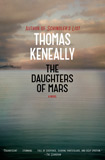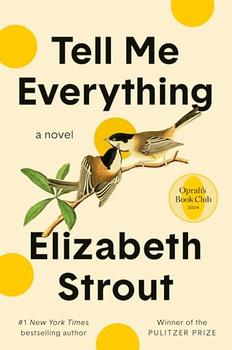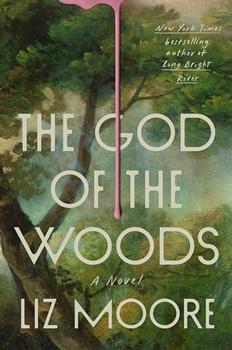Write your own review!
Barbara C. (Fountain Hills, AZ)
The Daughers of Mars
The Daughters of Mars. Mars the god of war. What a perfect title for a book which lays bare the horrors, the futility, the brutality, and "glories" of war. Sally and Naomi are the daughters, the faithful sister nurses from Australia, who devote three years of their lives to saving and mending the broken bodies and minds of the men who were fed into the flames of the war machine of World War I.
Keneally does not stint on the scenes, smells and feel of the men under fire who suffered shrapnel, bullets, bombings and the ghastly new killing device - mustard gas. The medical procedures, techniques and equipment used in 1916 were precursors of our modern medicine - chloroform, ether, blood transfusions, sepsis control, and morphine. As primitive as the surgical and medical theatres were, it was interesting to read that these methods saved lives and repaired bodies, even then.
The formal writing style of Keneally is rather Dickensian in it archaic structure, constrained tone, and unique turn of phrase. Several sentences and paragraphs required second readings to fully grasp the meaning and content of the words - vocabulary so diverse and complex to require a dictionary. The lack of quotation marks was, at first, a questionable technique, but, in reading further, it seemed to provide a flow and exchange of dialogue without the constant break of marks.
It took a while into the book before the sisters came to life. The constant jumping from one to the other within a chapter was disconcerting and a bit confusing. at first Charlie, Ian, Mitchie, Lady Tarlton and Constable were perfect foils as companions to the sisters. It was interesting to see the change in Naomi as she was introduced to the Quaker community, and Sally as Charlie exposed her to the art masters.
One criteria of a "good book" is its influence on the reader to further research ideas, characters, incidents, places, etc. The Daughters of Mars was a wealth of new information: ANZAC and involvement of Australians in WWI; the timeline and theatres of the war; the medical techniques; the devastation of venereal disease and influenza; the idea of conscription and shirkers were all concepts introduced in the book which required more thought and background research.
Of course, the ending still has me scratching my head. Did Keneally really mean to have two endings and have the reader pick? Was he trying to find the best ending? Am I missing something? After his forthright and non-emotional language throughout the book, the complex and magical realistic duplicity was a shock. Yes, there were little surprises here and there, like the questions as to whether Sally and Naomi did commit a mercy killing, but all in all, the story was rather straightforward until this mysterious ending.
If a book club is willing to read a very long and dense book, and is amenable to reading about lots and lots of bloody wartime injuries, this book has much food for thought and discussion.
Nancy O. (Hobe Sound, FL)
Couldn't put this one down
There's so much to this book that it will probably require a second reading (no problem there -- I've already ordered a "real" copy) but in the meantime, once I started it I was having trouble putting it down to do real-world things. I don't say that about a book too often, but this one drew me in and kept me there, largely due to a) its emphasis on the nurses and how they coped with the horrors of war all around them, b) the stories of the wounded soldiers whose lives were in some cases forever altered, and c) the number of interesting dilemmas posed by the author throughout the book. I was also caught up in Keneally's powerful writing -- although the book may have been a bit overlong, I was really taken by his ability to write in such a way that his descriptions became real, especially in the scenes of the attack on the ship and the depictions of the suffering of the wounded. As an FYI, the author does not use quotation marks around dialogue, but I didn't have a problem with it at all. Also, the dual endings might be confusing (or for some, annoying), but I found them to be in keeping with one of the overall themes of this book -- the randomness of life which at any time may offer a host of unexpected outcomes.
People who are interested in WWI might find this book of interest, since obviously an incredible amount of research went into this novel; readers of well-written historical fiction or anti-war fiction will also find it worth their while. It's also certainly a book club candidate for the number of issues raised throughout the story.
Super book, one I highly recommend.
 Sandra H. (St. Cloud, MN)
The War to End All Wars
Sandra H. (St. Cloud, MN)
The War to End All Wars
Too often novels about war are only incidentally about women or have secondary women characters. But in The Daughters of Mars Thomas Keneally puts them front and center allowing readers to see and experience what it was like to be a nurse in World War I, long before women were thought to be capable of doing more than cleaning up wards and wounded patients and following orders from anyone who wore pants.
Australians Sally and Naomi Durance are no nonsense young women who sign up to become military nurses in early 1915. During the next five years, they learn that there is much more to nursing than their training has prepared them for. From their first experience in the Dardanelles on the peninsula in Gallipoli where the Australians are brutally beaten in a battle the soldiers and their commanders had expected to win with ease, we follow them to France and England as they serve in hospitals and on the front. Sally, Naomi, and the other nurses fight battles to help severely wounded soldiers with serious head wounds, blindness, amputations, and PTSD using medical knowledge that was not much advanced from the American Civil War days. And they must also battle an ingrained male belief that women are indeed the weaker and less important of the sexes.
On a larger scale, Keneally shows the effects of this devastating war not only on the soldiers and the nurses, but also the civilians who struggle to understand the unimaginable. Lives are destroyed, love is found and lost. Keanelly spares us nothing.
I have but two complaints. First, a map of the Dardenelles and Gallipoli would have been especially useful. Next, I wish that Kenneally had simply ended the book without choices.
Read this book to experience life in a world that we know so little about and has as much to say about the human experience today as it does about life 100 years ago. Don't miss that experience.
Catherine M. (Mankato, MN)
Daughter of Mars
Thomas Keneally's book, "The Daughters of Mars" follows the two Durance—"if you put an 'en' in front of it, you have one of the most flattering of words"—sisters, Sally and Naomi. The people of Macleary, the sisters' rural Australian home district, have a difficult time keeping the two straight "since both girls were aloof and looked similar—dark and rather tall." This view of the sisters as interchangeable and indistinguishable is an important theme of the story and begins the opening chapter: "It was said around the valley that the two Durance girls went off, but just one bothered to come back." Which one actually comes back might be unclear to the people of Macleary, but this lack of distinction plays a considerable role at the end of the novel.
Keneally presents several interlocking moral dilemmas for the reader to consider as he contemplates the idea of humans "playing God." First, the sisters struggle with their mother's death from cancer, and their possible role in her demise. Later, Charlie Condon, Sally's friend, suggests that killing a soldier who fights for the same side is sometimes necessary and humane, noting: "Imagine this. Imagine a man who went out on a patrol last night and got somehow stuck out there no-man's land, wounded, thirsty beyond belief, in pain without morphine, hanging on the wire and calling to us in our trench. Calling, 'I'm here!' Calling, 'Help me, cobber!'" (page 421). If they try to rescue this man, Charlie argues, then the enemy will shoot them. But they are intolerant of the man's suffering—in much the same way that Sally and Naomi are intolerant of their mother's—so what are they to do?
The character of Ian Kiernan, a "Friend" (Quaker) and Naomi's fiancé, called a "shirker" by military officials and troops, but a "conscientious objector" by the Friends, serves as the voice of non-violence, of uncertainty about the purpose and rightfulness of war. In much the same way, the nurses of the AIF—daughters of Mars, the Roman god of war and son of Juno, the deity, guardian, and counselor of women—question the morality of healing, of succouring soldiers so that they can return to battle to be re-injured or killed.
This is a remarkable book from which I learned a great deal about conflict and suffering, compassion and sacrifice, from a new perspective. When Keneally's book is published I will recommend it to all my bibliophilic friends.
Caryl L. (Williamsburg, VA)
Daughters of Mars
This is a book that should not be taken lightly. I do not mean that it is grim, but the subject is a serious one.
It is the story of two girls, sisters, who volunteer to be nurses to the wounded and dying during World War I. They served almost entirely in France. What they saw and heard during that time was much more than they expected. They experienced the horrors and tragedies of working with their patients. They experienced sinking ships and bombings.
As miserable as this all sounds, it has its lighter moments which takes away from the sadness of war. On their leaves, they visit towns, historical sights and even trips to England adding of a little romance and love(not Hollywood style).
Author Keneally has drawn a picture of a difficult time in our history. However, is not a difficult book to read. It is well written; the characters real; and dotting it with more pleasant times.
It kept my interest throughout. My rating is 5
Deanna W. (Port Jefferson, NY)
Cataclysm of the Great War
This is an old fashioned saga (in the best sense of the word). The scope is huge - Australia, Egypt, England, and France. It deals with historically significant issues that are still very relevant today. As a reader one can "get lost" in wonderful story telling - friendships, romances, feuds, tragedies, and more.
 Carol T. (Ankeny, IA)
Super!
Carol T. (Ankeny, IA)
Super!
Daughters of Mars is excellent in so many ways. Not only has Keneally created an enthralling plot and interesting three-dimensional characters, but he managed to write in a way that captures 1915. I could be reading a diary written then, not a novel from nearly 100 years later.
 Cheryl W. (Crosby, MN)
Gallipoli
Cheryl W. (Crosby, MN)
Gallipoli
I knew nothing regarding this battle in WWI. This book tells the story of the nurses and patients entered into battle. They worked, survived and died under such adverse conditions. The Australians fought this battle with Britain and it was a failure for Churchill.
My only criticism is the end of the book. I had to read several times to find out who actually died as it was not clearly stated but in the beginning it does state one returns and one does not.




